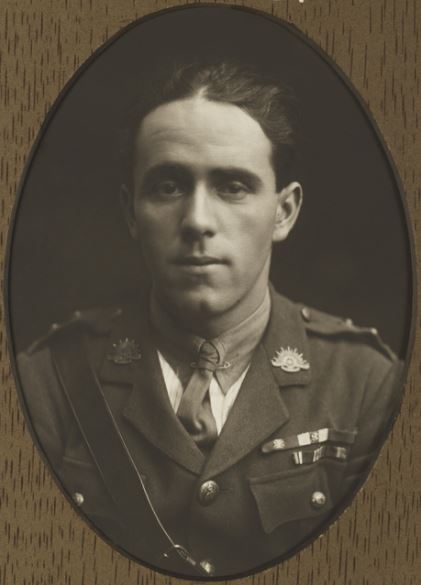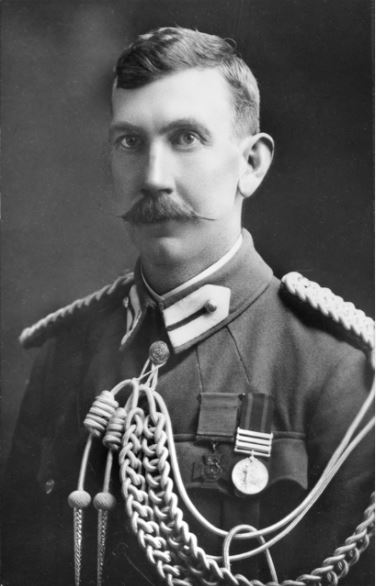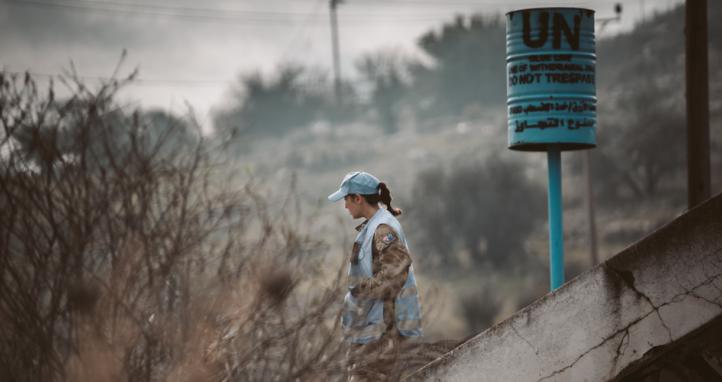Lieutenant Joseph Maxwell VC, MC and Bar, DCM (1896 - 1967, 71 yo)
 Joseph Maxwell was born on 10 February 1896 in Annandale, Sydney. A boilermaker by trade, he enlisted in the Australian Imperial Force on 8 February 1915 and was posted to the 18th Battalion. He served at Gallipoli before transferring to the Western Front in March 1916.
Joseph Maxwell was born on 10 February 1896 in Annandale, Sydney. A boilermaker by trade, he enlisted in the Australian Imperial Force on 8 February 1915 and was posted to the 18th Battalion. He served at Gallipoli before transferring to the Western Front in March 1916.
Promoted to Sergeant in October 1916, Maxwell was later assigned to a training battalion in England. He briefly returned to France in May 1917 before beginning officer training, though an altercation with military and civilian authorities led to disciplinary action and his return to his unit. Nevertheless, he was promoted to Warrant Officer and appointed Company Sergeant Major in August 1917.
During the Third Battle of Ypres in September, Maxwell assumed command of a platoon after its officer was killed. He led the men in an assault and later safely withdrew them from a newly captured position under intense fire. For this, he was awarded the Distinguished Conduct Medal and was commissioned in the field as a Second Lieutenant. Promoted to Lieutenant in January 1918, he continued to distinguish himself. In March, during a patrol near Ploegsteert, he spotted a large enemy force and led a successful attack after recalling his men, earning the Military Cross.
Maxwell was awarded a Bar to his Military Cross following actions near Rainecourt in August. The only uninjured officer in his company, he led the attack after rescuing the crew of a tank that had been hit. Despite being stunned by the explosion, he pressed on and ensured the company reached its objective.
On 3 October 1918, during the assault on the Beaurevoir-Fonsomme Line near Estrées, Maxwell displayed the courage that would earn him the Victoria Cross. After his company commander was wounded, he assumed command. Under heavy fire, he advanced alone through a gap in the enemy wire and neutralised a critical machine-gun position, enabling the company to achieve its objective. Later, he single-handedly eliminated another machine-gun post and, with two men and a prisoner, persuaded twenty Germans to surrender. Captured in the process, he killed two of his captors with a hidden pistol and escaped under fire before rallying a party to secure the enemy position.
By the end of the war, at just 22 years old, Maxwell had been awarded the Victoria Cross, the Distinguished Conduct Medal, the Military Cross and Bar, making him one of the most decorated Australian soldiers of the First World War. He returned to Australia in 1919 and held various jobs across New South Wales and the ACT.
In later life, Maxwell struggled with health issues. At the outbreak of the Second World War, he attempted to enlist again and, after being rejected due to age, joined under a false name in Queensland. Once discovered, he was discharged. In 1956, he remarried and in 1964 attended the opening of VC Corner at the Australian War Memorial, though he opposed the grouping of VC medals on display.
Joseph Maxwell died of a heart attack on 6 July 1967 in Matraville, Sydney. He was cremated with military honours after a service at St Matthias Anglican Church, Paddington. His widow later donated his medals to the Army Museum at Victoria Barracks. Maxwell is widely considered one of the most decorated Australians of the First World War.
Lieutenant Colonel Leslie Cecil Maygar VC (1868 - 1917, 49 yo)

Leslie Maygar was born in Kilmore, Victoria on 27 May 1868. After completing his education, he worked alongside his father and brothers on the family property, Strathearn Station, near Euroa. In March 1891, he joined the Victorian Mounted Rifles, marking the beginning of a long and distinguished military career.
Initially rejected for overseas service in the South African War due to a dental issue, Maygar eventually deployed with the 5th Mounted Rifles, arriving in Cape Town in March 1901. He served across South Africa and later in Natal. On 23 November 1901, during an action at Geelhoutboom, Lieutenant Maygar performed a daring rescue under heavy enemy fire. With the enemy only 200 yards away, he dismounted to assist a fellow soldier whose horse had been shot, placed him on his own mount, and sent him to safety while running back on foot. For this act of conspicuous bravery, Maygar was awarded the Victoria Cross, presented by Lord Kitchener. He was also Mentioned in Dispatches before returning to Australia in March 1902.
Maygar remained in military service, earning promotion to Captain in 1905. With the outbreak of the First World War, he enlisted in the Australian Imperial Force and was appointed Captain in the 4th Light Horse Regiment. At Gallipoli, he rose to Major and, in October 1915, was promoted to Lieutenant Colonel and given temporary command of the 8th Light Horse Regiment. During the evacuation of Gallipoli, he led the final rear-guard of forty men, a task he described as the "post of honour."
He continued to command the regiment through the Sinai and Palestine campaigns. During the Second Battle of Gaza on 19 April 1917, Maygar displayed remarkable leadership, riding exposed across the battlefield throughout the day to inspire his men amid heavy casualties. His gallantry earned him the Distinguished Service Order in June 1917, and he was Mentioned in Dispatches three times between 1916 and 1918.
On 31 October 1917, during the Battle of Beersheba, Maygar was struck by enemy aircraft fire. His arm shattered, he was separated from his horse and later found by troops. Despite being recovered, he succumbed to his wounds the following day at Karm. Known affectionately as "Elsie," Maygar was remembered as a brave, selfless, and deeply respected commander.
His legacy endures as one of Australia's most admired military leaders, embodying the spirit of leadership and courage across two major conflicts.
Last Reviewed 06/2025









